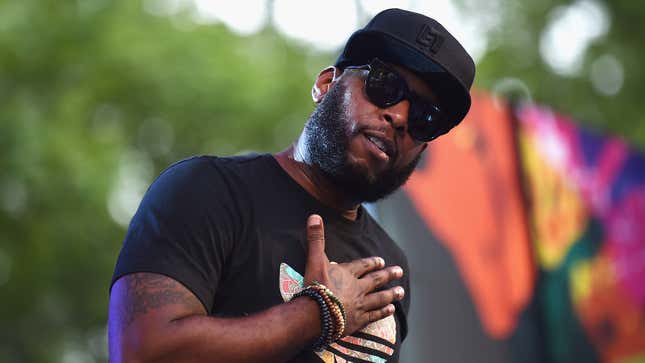Talib Kweli Is Suing Jezebel for ‘Emotional Distress’
Kweli "went into a depression state of loss of appetite, sleeplessness, edgy, anxiety, and discomfort around certain women" due to our story, the lawsuit says.
Celebrities

Rapper Talib Kweli is suing Jezebel for emotional distress that he claims we caused him with our 2020 story, “Talib Kweli’s Harassment Campaign Shows How Unprotected Black Women Are Online and Off.” The piece detailed the then-44-year-old rapper’s social media interactions with and about a then-24-year-old student and activist named Maya Moody—interactions that Twitter found warranted his permanent suspension from the platform. He filed his at-times bizarre and indecipherable suit on Thursday in New York Supreme Court against our parent company G/O Media and the piece’s author, Ashley Reese.
Had Kweli taken issue with the veracity of any of our commentary, he surely would have sued us for libel—but the statute of limitations for libel came and went last year. And so Kweli instead claims our story resulted in a “negligent infliction of emotional distress,” one so deep that he “went into a depression state of loss of appetite, sleeplessness, edgy, anxiety, and discomfort around certain women.” Much as we’d like to, we can’t link to or quote from the Jezebel story in question (per our lawyers), because doing so would risk restarting the statute of limitations clock and creating a multi-part arc that could easily fill out a Law & Order episode. Instead, here is what a Twitter spokesperson said about banning Kweli at the time:
[Talib Kweli’s] account has been permanently suspended after repeated violations of the Twitter rules. Twitter’s purpose is to serve the public conversation. Violence, harassment and other similar types of behavior discourage people from expressing themselves, and ultimately diminish the value of global public conversation. Our rules are to ensure all people can participate in the public conversation freely and safely.
Interestingly, Kweli (whose real name is Talib Kweli Greene) filed the suit pro se, meaning on his own behalf. That explains some of the odd wording, in which he alleges that we used him as “guinea pig to clarify how black men treat black women,” whatever that means. Everyone’s entitled to have their day in court, of course, but seems odd to us that the longtime rapper with over a dozen albums to his name wouldn’t turn to someone who graduated law school to shepherd his case. Or maybe he did? Kweli’s brother is renowned Columbia Law professor Jamal Greene, one of the nation’s leading constitutional law scholars. Greene is also one of four co-chairs of Facebook’s Oversight Board, which “uses its independent judgment to support people’s right to free expression and ensure those rights are being adequately respected.”
Kweli claims Jezebel piece painted him as “some monster that didn’t like black women, when 500k plus of his fans are black women, his ex-wife and child’s mother are black women, and his employees are black women.” He cites “Brown Skin Lady” from his 1998 album, Mos Def & Talib Kweli Are Black Star, as counter evidence, reasoning, “The fact that plaintiff Talib Kweli wrote the song ‘Brown Skin Lady’ in an album that charted #53 on US Billboard 200 and #13 US Top R&B/Hip-Hop Albums (Billboard) in 1998, this song was famous worldwide.” He bolsters the point by citing his own lyrics in the suit:
“My brown lady creates environments for happy brown babies, I know it sounds crazy, but your skin’s the inspiration for cocoa butter. You provoke a brother; we should get to know one another I discover when I bring you through my people say TRUE, all I can say is all praise due I thank you God for a beauty like you [Talib] This goes to the brown skin ladies.”
Kweli is asking for $300,000 in damages, or half his salary, he says.
We are legally required to issue the following statement from a G/O Media spokesperson: “Jezebel’s article fairly reported on the controversy which led to the permanent suspension of Talib Kweli’s Twitter account. This suit, filed two years after the story was published, has no merit and the company will be seeking our attorneys fees pursuant to the protections afforded to the press to publish stories about matters of public interest like this one.”
Obviously, we stand by our story.